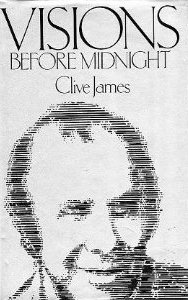[contextly_auto_sidebar id=”Af3WnbX7JuSvdi2C0uLj0Xwv9IxmV5r4″]
HOW much longer will the beleaguered polymath last? No one knows. But my friend and guest columnist Lawrence Christon has penned an appreciation of the great Australian-born writer. With no further ado:
“THE LONG GOODBYE,” By Lawrence Christon
At 75, Clive James is close to the end of a battle with a form of leukemia that’s gone on so long that he’s expressed embarrassment over outlasting his presumed expiration period. That mild touch of chagrin is oddly characteristic of one of our great living polymaths. As poet, TV and literary critic, memoirist, essayist, scholar, interviewer, and man who became famous on U.S. television by commenting on fame, the Australian-born, London-based James is one of the few remaining public intellectuals whose sense of humor and breadth of interest haven’t been stifled by academia.
That’s partly because, after earning honors at Cambridge, he’s stayed out of it. He doesn’t think education leads to a career; to him, education is the career. When he writes of late nineteenth and early twentieth century Vienna, and how the Austrian, German, and Central European university systems denied tenure to Jews, he’s more than happy to imagine himself among the cosmopolitan likes of Raymond Aron, Walter Benjamin, Marc Bloch, and Egon Fredell, sitting at café and cabaret tables to talk the night away on history, ideas, culture and politics. He was too young actually to have been there, but he saw in them his own driven style toward “journalism, plain speech, direct observation and the necessity to entertain.”
He also saw the culminating force of what they all, one way or another, embodied, as with Stefan Zweig, “[whose] life, work, exile and self-inflicted death combine to sum up so much of what has gone before, which is really the story of the will to achievement in the face of all the conditions for despair.”
For those who aspire to civilization, the dynamic persists. Just look around. James has, for well over forty years and through over twenty-five published volumes. His “Cultural Amnesia,” which came out in 2007, is a brilliant summary example of a fertile, idiosyncratic mind refusing to make itself up on dozens of important figures ranging from Anna Akhmatova to Duke Ellington to Unamuno, Einstein, Flaubert, Freud and, improbably, Tony Curtis. Who really gets the last word anyway? James takes their measure without measuring them, except now and then to allude to the hypocrisy of bad faith, as in Sartre’s care not to level direct broadsides toward the occupying fascists who prided themselves on their appreciation of culture and ideas, including those of Sartre.
James is among the wittiest writers alive, without calling attention to his talent to amuse. He leaves that to his prose, of which he’s written, “the English language has always made its main initial impact through the turn of single phrase.” He’s a master of understatement and indirection, of angles and switchbacks, which give his sentences texture and bite. And style, which represents far more than flourish.
When writing of his late friend and former classmate, the art critic and historian Robert Hughes “…There are degrees of anguish which only style can contemplate…” he might as well have written about himself. Decades ago I read his first book, “Unreliable Memoirs.” I laughed so hard that I genuinely feared for my lungs collapsing. And still I couldn’t stop. When I picked it up more recently, all I could experience was the anguish.
All writing is discovery. To read James is to keep arriving at that surprising somewhere. To wit:
“…there is no such thing as an individual voice: there is only an individual responsibility…”
“..much beauty begins as a consolation for what can’t be mended.”
“…the unearned omniscience of postmodernism depends on its facility for connecting things without examining them.”
“…the occult and the mystically profound are perennial short cuts to a supervening vision: a world view without the world.”
“A work of art has to be judged by its interior vitality, not by its agreed prestige.”
“Praise and blame are aspects of the same thing. The capacity for criticism is the capacity for enjoyment.”
There seems to be no limit to his desire to share that enjoyment. But there’s an underlying seriousness too. In a world only fitfully coherent, he explains his humanist credo:
“As a journalist and critic, a premature postmodernist, I was often criticized in my turn for talking about the construction of a poem and of a Grand Prix racing car in the same breath, or of treating gymnasts and high divers…as if they were practicing the art of sculpture. It was a sore point, and often sore points reveal where the real point is. Humanism wasn’t in the separate activities: humanism was the connection between them. Humanism was a particularized but unconfined concern with all the high-quality products of the creative impulse, which could be distinguished from the destructive one by its propensity to increase the variety of the creative world rather than reduce it.”
It’s an unusual sensation to know that, while most of us still reading James will outlive him, he’ll eventually wind up outliving us all.

Austrian-born ?!
Oops — copy editor on vacation this week — fixed